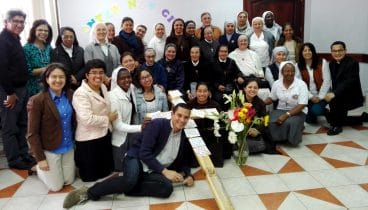
Nov 10, 2017 | Focolare Worldwide
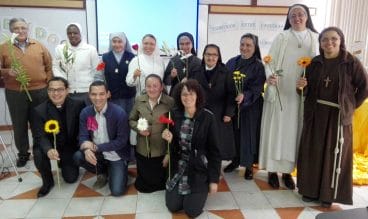 A magnificent garden of many flowers and colours – that is how the many farms appear in Ecuador that export their prized floral varieties worldwide. It is an image that Sr. Vanessa, a Franciscan youth missionary, used to introduce the spiritual retreat held 22 October in Quito, at the headquarters of the Ecuadorian Religious Conference. Sr. Vanessa had just recently finished a year at Casa Emmaus in Loppiano, the spirituality center for religious sisters who hope to go deeper into the Focolare charism. There in Ecuador she found no better example of the Church and its variety of charisms, with 27 consecrated sisters and one brother from 11 different congregations who had accepted the invitation. Utilizing a group dynamic, the young nun asked each participant to hang the word that each of the founders’ charisms was based on next to the crucifix there in the hall. This showed how the idea of each charism, brought about by the Spirit, is a new Christ unfolding throughout the centuries. Staying with her floral metaphor, each participant was given a flower that was different from the others, just as the charisms are different. They are different beauties that in communion, and in their common service of the Church, find themselves empowered and fulfilled.
A magnificent garden of many flowers and colours – that is how the many farms appear in Ecuador that export their prized floral varieties worldwide. It is an image that Sr. Vanessa, a Franciscan youth missionary, used to introduce the spiritual retreat held 22 October in Quito, at the headquarters of the Ecuadorian Religious Conference. Sr. Vanessa had just recently finished a year at Casa Emmaus in Loppiano, the spirituality center for religious sisters who hope to go deeper into the Focolare charism. There in Ecuador she found no better example of the Church and its variety of charisms, with 27 consecrated sisters and one brother from 11 different congregations who had accepted the invitation. Utilizing a group dynamic, the young nun asked each participant to hang the word that each of the founders’ charisms was based on next to the crucifix there in the hall. This showed how the idea of each charism, brought about by the Spirit, is a new Christ unfolding throughout the centuries. Staying with her floral metaphor, each participant was given a flower that was different from the others, just as the charisms are different. They are different beauties that in communion, and in their common service of the Church, find themselves empowered and fulfilled. 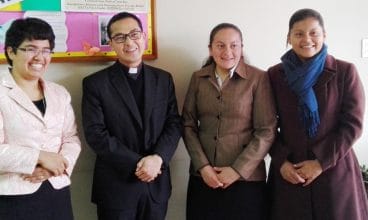 The program featured – in addition to talks that explored the value of communion between the new and ancient charisms in the Church and the truly different manner in which they developed or were nurtured – ample time for sharing. The Ecuadorian Religious Conference, in fact, had promoted the retreat with the title “Communion between charisms, a testimony of hope.” The occasion was the happy coincidence of the Mother Superior of the Little Servants of the Sacred Heart, Sr. Imelda Rizzato, visiting Ecuador. She has known about Focolare spirituality since her days in novitiate. She was able to share the impact that this spirituality had for her. Besides reinforcing her choice of vocation, it gave her a particular inclination to weave relationships of communion with those she met. In doing so, according to her superiors, she was living out the charism of her founder, Blessed Carlo Liviero, in an authentic way. In time the congregation gave her a number of responsibilities, to the point of asking her to be their highest guide. It is a role that she tries to carry out together with her sisters, with an openness and communion with other realities in the Church and other religious families. The goal is the “Church which goes forth” that the pope expects.
The program featured – in addition to talks that explored the value of communion between the new and ancient charisms in the Church and the truly different manner in which they developed or were nurtured – ample time for sharing. The Ecuadorian Religious Conference, in fact, had promoted the retreat with the title “Communion between charisms, a testimony of hope.” The occasion was the happy coincidence of the Mother Superior of the Little Servants of the Sacred Heart, Sr. Imelda Rizzato, visiting Ecuador. She has known about Focolare spirituality since her days in novitiate. She was able to share the impact that this spirituality had for her. Besides reinforcing her choice of vocation, it gave her a particular inclination to weave relationships of communion with those she met. In doing so, according to her superiors, she was living out the charism of her founder, Blessed Carlo Liviero, in an authentic way. In time the congregation gave her a number of responsibilities, to the point of asking her to be their highest guide. It is a role that she tries to carry out together with her sisters, with an openness and communion with other realities in the Church and other religious families. The goal is the “Church which goes forth” that the pope expects.  Sr Imelda and the other sisters who spoke were able to bear witness to how the charism of unity by no means conflicts with their individual charisms. On the contrary, it is a true help to accomplish what the Church expects of each charism, individually and in communion between them. News of the retreat even reached Apostolic Nunzio Monsignor Andrés Carrascosa, who not only allowed the sisters of the papal nunziature to participate, but sent his secretary to celebrate Mass. Staying for the entire meeting, the secretary said that it was a “true privilege to be there.” The day after the retreat some of the sisters wished to visit the Focolare center. They were putting down the foundations for their new path of unity between charisms in Ecuador, to open new horizons and give hope to the Church and the world.
Sr Imelda and the other sisters who spoke were able to bear witness to how the charism of unity by no means conflicts with their individual charisms. On the contrary, it is a true help to accomplish what the Church expects of each charism, individually and in communion between them. News of the retreat even reached Apostolic Nunzio Monsignor Andrés Carrascosa, who not only allowed the sisters of the papal nunziature to participate, but sent his secretary to celebrate Mass. Staying for the entire meeting, the secretary said that it was a “true privilege to be there.” The day after the retreat some of the sisters wished to visit the Focolare center. They were putting down the foundations for their new path of unity between charisms in Ecuador, to open new horizons and give hope to the Church and the world.
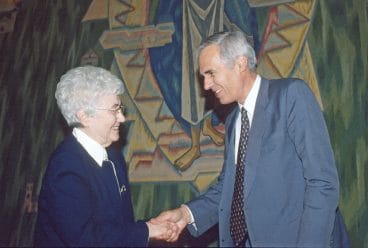
Nov 9, 2017 | Focolare Worldwide
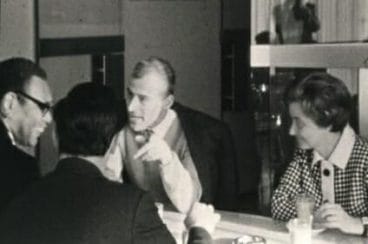
Geneva 1967: Chiara at the WCC with Philip Potter and Lukas Vischer

Geneva, October 2002: Chiara Lubich and Dr Konrad, then Secretary-General of WCC
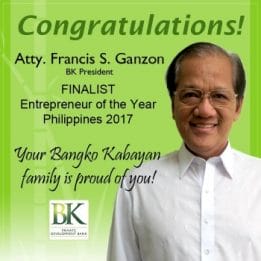
Oct 26, 2017 | Focolare Worldwide
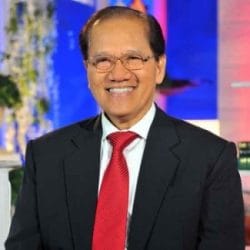 It is currently one of the biggest rural banks of the Philippines. But when Francis Ganzon (67 years old) took the helm in 1989, it only had one branch. Since then, the Institute has engaged in the support and empowering of the small and medium enterprises (SME), through the offer of quality financial systems “with a workforce united with God,” as the Bank site describes its “mission”. After obtaining his law degree, Ganzon dedicated himself to saving an institute, the Ibaan Rural Bank, Inc. (IRB), which was involved in cases of fraud. “I promoted a different work style, focusing on compliance with the laws, professionalism and centrality of the people, and promoted new practices in line with Christian values.” Ganzon embraced the spirit of the Economy of Communion, the international network of entrepreneurs engaged in putting the Social Doctrine of the Church into practice. “Subsequently, we created the Ibaan Rural Bank Foundation, with the objective of extending the microcredit programme also to deserving students with economic difficulties, through scholarships. The Asian financial crisis of 1997 also struck our bank, but we did not close down also thanks to the trust of our clients. That same year, the Bank celebrated its 40th Anniversary, and we changed its name to Bangko Kabayan (fraternity bank) as a further effort to supply people in need with the possibility to access microcredits in order to elevate their own standard of living.”
It is currently one of the biggest rural banks of the Philippines. But when Francis Ganzon (67 years old) took the helm in 1989, it only had one branch. Since then, the Institute has engaged in the support and empowering of the small and medium enterprises (SME), through the offer of quality financial systems “with a workforce united with God,” as the Bank site describes its “mission”. After obtaining his law degree, Ganzon dedicated himself to saving an institute, the Ibaan Rural Bank, Inc. (IRB), which was involved in cases of fraud. “I promoted a different work style, focusing on compliance with the laws, professionalism and centrality of the people, and promoted new practices in line with Christian values.” Ganzon embraced the spirit of the Economy of Communion, the international network of entrepreneurs engaged in putting the Social Doctrine of the Church into practice. “Subsequently, we created the Ibaan Rural Bank Foundation, with the objective of extending the microcredit programme also to deserving students with economic difficulties, through scholarships. The Asian financial crisis of 1997 also struck our bank, but we did not close down also thanks to the trust of our clients. That same year, the Bank celebrated its 40th Anniversary, and we changed its name to Bangko Kabayan (fraternity bank) as a further effort to supply people in need with the possibility to access microcredits in order to elevate their own standard of living.”  “Many clients – continued Ganzon – did not have collaterals, but we considered them as worthy people. This created a rapport of mutual trust: the bank trusted people and granted loans, and the clients trusted the bank. In this way Bangko Kabayan had a strong social impact, improving the lives of many people and many small enterprises. Then it became the preferred credit provider of the SME in our region, opening 23 branches in the provinces of Batangas, Quezon and Laguna.” In the near future, Bangko Kabayan will be committed to building a balanced portfolio of loans and capital, and in investing further in the new technologies, particularly in internet banking. Up to now Bangko Kabayan has been receiving various awards. In 2007, it received the best Capital Build-up in the PremiLandbank and was ranked among the best credit institutes at global level for microcredit. From 2008 to 2011 and again in 2013 and 2015, it was nominated in the region where it has its main office, a partner of the Land Bank of the Philippines. It moreover received Microenterprise access to the MF EAGLE award for bank service from 2003 to 2007 and again in 2010 and 2011. «Determination and integrity will always be compensated,” concluded Ganzon. “I am anxiously waiting for the day in which bank transactions can be done with a handshake instead of on paper.”
“Many clients – continued Ganzon – did not have collaterals, but we considered them as worthy people. This created a rapport of mutual trust: the bank trusted people and granted loans, and the clients trusted the bank. In this way Bangko Kabayan had a strong social impact, improving the lives of many people and many small enterprises. Then it became the preferred credit provider of the SME in our region, opening 23 branches in the provinces of Batangas, Quezon and Laguna.” In the near future, Bangko Kabayan will be committed to building a balanced portfolio of loans and capital, and in investing further in the new technologies, particularly in internet banking. Up to now Bangko Kabayan has been receiving various awards. In 2007, it received the best Capital Build-up in the PremiLandbank and was ranked among the best credit institutes at global level for microcredit. From 2008 to 2011 and again in 2013 and 2015, it was nominated in the region where it has its main office, a partner of the Land Bank of the Philippines. It moreover received Microenterprise access to the MF EAGLE award for bank service from 2003 to 2007 and again in 2010 and 2011. «Determination and integrity will always be compensated,” concluded Ganzon. “I am anxiously waiting for the day in which bank transactions can be done with a handshake instead of on paper.”
Oct 19, 2017 | Focolare Worldwide
The clashes have started again and the tension is high. On 22 September and 1 October the army suppressed the peaceful demonstrations, killing and wounding some of the protesters who were asking for the independence of the British-speaking regions. That same day in the Northwest and Southwest Regions (inhabited by an English minority, 20 % of Cameroon’s population), once again internet was cut off. The “English-speaking issue” is well rooted in the past. In October 2016, the English-speaking population had started to hold organized protests against its progressive marginalisation. After months of tensions and accusations of discrimination, violent repressions followed, with real guerilla actions. Fr. Antonio Mascia writes from Fontem: “This is a delicate and uncertain time from the socio-political point of view, and we do not know where it will lead to. In various cities, soldiers of the army shot at the crowd that was peacefully demonstrating and many people were arrested. We are counting on your prayers.”
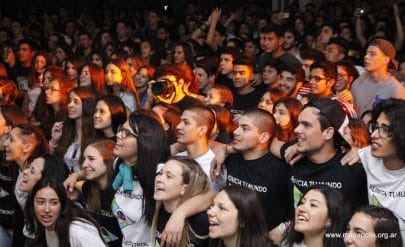
Oct 16, 2017 | Focolare Worldwide
 Once again this year the Youth Fest that coincides with the start of spring in the southern hemisphere, has made its mark. On September 23 and 24 more than a thousand young people from Uruguay, Paraguay and several regions of Argentina took over the permanent Mariapolis immersed in the Argentinian Pampas, to have an experience of brotherhood. But this year they’re looking farther – to Manila where the 2018 Genfest will be held with young people from around the world.
Once again this year the Youth Fest that coincides with the start of spring in the southern hemisphere, has made its mark. On September 23 and 24 more than a thousand young people from Uruguay, Paraguay and several regions of Argentina took over the permanent Mariapolis immersed in the Argentinian Pampas, to have an experience of brotherhood. But this year they’re looking farther – to Manila where the 2018 Genfest will be held with young people from around the world.  Using a video game format, the young people gradually confront some of the issues they have to face in their daily lives: appearance, individualism, choices and consumerism. These are the four levels that the four actors on stage have to pass through to overcome and reach the last level with each other’s help. The keys that get them through each level are: values such as self-acceptance, solidarity, effort with regard to what the conscience suggests to every one of us, and sharing. But often you need to take into account the past that draws you back and the future that can paralyse you. Only one option is left: to live the present and, in that moment, take control and reset your history.
Using a video game format, the young people gradually confront some of the issues they have to face in their daily lives: appearance, individualism, choices and consumerism. These are the four levels that the four actors on stage have to pass through to overcome and reach the last level with each other’s help. The keys that get them through each level are: values such as self-acceptance, solidarity, effort with regard to what the conscience suggests to every one of us, and sharing. But often you need to take into account the past that draws you back and the future that can paralyse you. Only one option is left: to live the present and, in that moment, take control and reset your history.  The inventor of the game leaves the actors and the Youth Fest participants with a question: Reset, yes or no? The answer is left open. The video game ends and becomes a metaphor for life that places the players in front of the possibility of going through the daily situations of life in order to grow and reach their personal goals. The game becomes real life. Reset your life, you’re in control is the slogan of the event which, with the help of songs that had been composed for the event, planted the message of the 2017 Youth Fest in the hearts of all the participants.
The inventor of the game leaves the actors and the Youth Fest participants with a question: Reset, yes or no? The answer is left open. The video game ends and becomes a metaphor for life that places the players in front of the possibility of going through the daily situations of life in order to grow and reach their personal goals. The game becomes real life. Reset your life, you’re in control is the slogan of the event which, with the help of songs that had been composed for the event, planted the message of the 2017 Youth Fest in the hearts of all the participants.

 A magnificent garden of many flowers and colours – that is how the many farms appear in Ecuador that export their prized floral varieties worldwide. It is an image that Sr. Vanessa, a Franciscan youth missionary, used to introduce the spiritual retreat held 22 October in Quito, at the headquarters of the Ecuadorian Religious Conference. Sr. Vanessa had just recently finished a year at Casa Emmaus in Loppiano, the spirituality center for religious sisters who hope to go deeper into the Focolare charism. There in Ecuador she found no better example of the Church and its variety of charisms, with 27 consecrated sisters and one brother from 11 different congregations who had accepted the invitation. Utilizing a group dynamic, the young nun asked each participant to hang the word that each of the founders’ charisms was based on next to the crucifix there in the hall. This showed how the idea of each charism, brought about by the Spirit, is a new Christ unfolding throughout the centuries. Staying with her floral metaphor, each participant was given a flower that was different from the others, just as the charisms are different. They are different beauties that in communion, and in their common service of the Church, find themselves empowered and fulfilled.
A magnificent garden of many flowers and colours – that is how the many farms appear in Ecuador that export their prized floral varieties worldwide. It is an image that Sr. Vanessa, a Franciscan youth missionary, used to introduce the spiritual retreat held 22 October in Quito, at the headquarters of the Ecuadorian Religious Conference. Sr. Vanessa had just recently finished a year at Casa Emmaus in Loppiano, the spirituality center for religious sisters who hope to go deeper into the Focolare charism. There in Ecuador she found no better example of the Church and its variety of charisms, with 27 consecrated sisters and one brother from 11 different congregations who had accepted the invitation. Utilizing a group dynamic, the young nun asked each participant to hang the word that each of the founders’ charisms was based on next to the crucifix there in the hall. This showed how the idea of each charism, brought about by the Spirit, is a new Christ unfolding throughout the centuries. Staying with her floral metaphor, each participant was given a flower that was different from the others, just as the charisms are different. They are different beauties that in communion, and in their common service of the Church, find themselves empowered and fulfilled.  The program featured – in addition to talks that explored the value of communion between the new and ancient charisms in the Church and the truly different manner in which they developed or were nurtured – ample time for sharing. The Ecuadorian Religious Conference, in fact, had promoted the retreat with the title “Communion between charisms, a testimony of hope.” The occasion was the happy coincidence of the Mother Superior of the Little Servants of the Sacred Heart, Sr. Imelda Rizzato, visiting Ecuador. She has known about Focolare spirituality since her days in novitiate. She was able to share the impact that this spirituality had for her. Besides reinforcing her choice of vocation, it gave her a particular inclination to weave relationships of communion with those she met. In doing so, according to her superiors, she was living out the charism of her founder, Blessed Carlo Liviero, in an authentic way. In time the congregation gave her a number of responsibilities, to the point of asking her to be their highest guide. It is a role that she tries to carry out together with her sisters, with an openness and communion with other realities in the Church and other religious families. The goal is the “Church which goes forth” that the pope expects.
The program featured – in addition to talks that explored the value of communion between the new and ancient charisms in the Church and the truly different manner in which they developed or were nurtured – ample time for sharing. The Ecuadorian Religious Conference, in fact, had promoted the retreat with the title “Communion between charisms, a testimony of hope.” The occasion was the happy coincidence of the Mother Superior of the Little Servants of the Sacred Heart, Sr. Imelda Rizzato, visiting Ecuador. She has known about Focolare spirituality since her days in novitiate. She was able to share the impact that this spirituality had for her. Besides reinforcing her choice of vocation, it gave her a particular inclination to weave relationships of communion with those she met. In doing so, according to her superiors, she was living out the charism of her founder, Blessed Carlo Liviero, in an authentic way. In time the congregation gave her a number of responsibilities, to the point of asking her to be their highest guide. It is a role that she tries to carry out together with her sisters, with an openness and communion with other realities in the Church and other religious families. The goal is the “Church which goes forth” that the pope expects.  Sr Imelda and the other sisters who spoke were able to bear witness to how the charism of unity by no means conflicts with their individual charisms. On the contrary, it is a true help to accomplish what the Church expects of each charism, individually and in communion between them. News of the retreat even reached Apostolic Nunzio Monsignor Andrés Carrascosa, who not only allowed the sisters of the papal nunziature to participate, but sent his secretary to celebrate Mass. Staying for the entire meeting, the secretary said that it was a “true privilege to be there.” The day after the retreat some of the sisters wished to visit the Focolare center. They were putting down the foundations for their new path of unity between charisms in Ecuador, to open new horizons and give hope to the Church and the world.
Sr Imelda and the other sisters who spoke were able to bear witness to how the charism of unity by no means conflicts with their individual charisms. On the contrary, it is a true help to accomplish what the Church expects of each charism, individually and in communion between them. News of the retreat even reached Apostolic Nunzio Monsignor Andrés Carrascosa, who not only allowed the sisters of the papal nunziature to participate, but sent his secretary to celebrate Mass. Staying for the entire meeting, the secretary said that it was a “true privilege to be there.” The day after the retreat some of the sisters wished to visit the Focolare center. They were putting down the foundations for their new path of unity between charisms in Ecuador, to open new horizons and give hope to the Church and the world.



 It is currently one of the biggest rural banks of the Philippines. But when Francis Ganzon (67 years old) took the helm in 1989, it only had one branch. Since then, the Institute has engaged in the support and empowering of the small and medium enterprises (SME), through the offer of quality financial systems “with a workforce united with God,” as the Bank site describes its “mission”. After obtaining his law degree, Ganzon dedicated himself to saving an institute, the Ibaan Rural Bank, Inc. (IRB), which was involved in cases of fraud. “I promoted a different work style, focusing on compliance with the laws, professionalism and centrality of the people, and promoted new practices in line with Christian values.” Ganzon embraced the spirit of the
It is currently one of the biggest rural banks of the Philippines. But when Francis Ganzon (67 years old) took the helm in 1989, it only had one branch. Since then, the Institute has engaged in the support and empowering of the small and medium enterprises (SME), through the offer of quality financial systems “with a workforce united with God,” as the Bank site describes its “mission”. After obtaining his law degree, Ganzon dedicated himself to saving an institute, the Ibaan Rural Bank, Inc. (IRB), which was involved in cases of fraud. “I promoted a different work style, focusing on compliance with the laws, professionalism and centrality of the people, and promoted new practices in line with Christian values.” Ganzon embraced the spirit of the 

 Using a video game format, the young people gradually confront some of the issues they have to face in their daily lives: appearance, individualism, choices and consumerism. These are the four levels that the four actors on stage have to pass through to overcome and reach the last level with each other’s help. The keys that get them through each level are: values such as self-acceptance, solidarity, effort with regard to what the conscience suggests to every one of us, and sharing. But often you need to take into account the past that draws you back and the future that can paralyse you. Only one option is left: to live the present and, in that moment, take control and reset your history.
Using a video game format, the young people gradually confront some of the issues they have to face in their daily lives: appearance, individualism, choices and consumerism. These are the four levels that the four actors on stage have to pass through to overcome and reach the last level with each other’s help. The keys that get them through each level are: values such as self-acceptance, solidarity, effort with regard to what the conscience suggests to every one of us, and sharing. But often you need to take into account the past that draws you back and the future that can paralyse you. Only one option is left: to live the present and, in that moment, take control and reset your history.